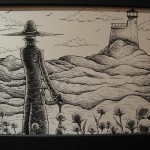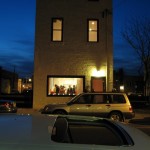Post by Shawn Dubin
Outside the fun of all the characters on display in costume and out, comic con was a great learning experience for me this year. Strangely, what a lot of folks don’t realize is that there are panels throughout the weekend that touch on what goes on inside the industry, as well as those that push the industry’s agenda, given by working professionals.

I had the opportunity to attend a number of panels at the event, all of which offered up valuable insight into the industry I ultimately would love to be a part of one day. New York City Comic Con was held at the Javitz Center from Friday, Oct. 8 to Sunday, Oct. 10. I’ll break it down by the day.
Friday:
During the professional hours, before the giant throngs of fans and the curious alike took to the hall, I had the opportunity to speak to a senior editor at Dark Horse Comics. I showed him a selection of my comic book work, which I was toting about in a portfolio to allow editors and the like to see my work full size (11×17”). I also had printed packets of the same work at 8.5×11″ to leave with said (hopefully) interested parties. He gave me a great critique, pointing out flaws in story-telling and excessive detail here and there but also said that I have a great eye for conveying emotion. He gave me his card and asked me to send him more samples down the line. Already formulating my revisions.
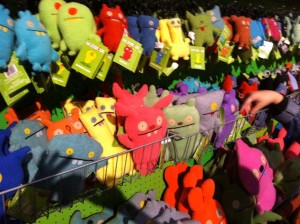
At 2:15, I headed over to the DC Talent Search Orientation, where a steadily filling room was treated to loads of good advice about how to approach editors at cons, what they may want to see, standards to keep ourselves to as artists, and how to take rejection in stride without losing hope. At the end, we were all instructed to take the DC Talent Search form, attach it to our submissions and drop them at their booth.
At 4:30, I went over to the “Breaking Into Comics the Marvel Way” panel. Established artists and writers went over how they made their way into the comics business. One steady theme throughout- luck. It’s all about meeting people, being polite, talking to them, never burning bridges, and having talent. You never know who you’re going to meet.
At 5:45 I went to the Dark Horse panel which was basically a sales pitch for their line-up of future publications, so I left and wandered about, dropping off my submissions at the Marvel and DC booths.
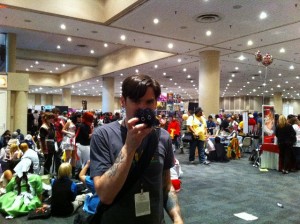
At 7:45, I found my way over to what may have been the most useful session of the weekend, “Getting Graphic Novels Considered for Publication”. Run by a literary agent from a firm in New York, and a recovering lawyer/publisher/talent scout, the session offered up pointers on getting your work to a publishing house through literary agents, determining whether what you’ve got is franchise material (can be made into a film or series of comic books, etc), what’s necessary to make a pitch, how to vet an agent, etc.
Saturday:
We went over to the convention bright and early to see about my chances with DC and Marvel (the Big Two as they’re called). No dice. To deal with the rejection and escape the massive crowds, I spent the afternoon in Central Park with my wife and some good friends. No tears, I swear.
Sunday:
10:45 was “How to Get a Job in Video Games”. Not my favorite panel. Basically, what I got from this one was that the industry is not as strong in a recession and that it’s hard to break in to video games. I would have much rather been in the Miyazaki (amazing Japanese animator) panel with my wife. Ended up leaving early and grabbing coffee before my next panel.
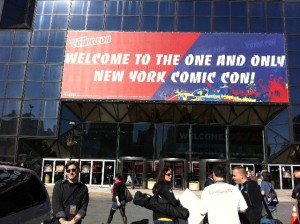
Noon- “How to Draw Comics the Image Way” was a source of great inspiration for being able to get your comics into the mainstream without necessarily giving up the rights and ownership. It also offered a great deal of insight into what they may be looking for in terms of submissions. They serve as publisher to your book for printing, press and distribution, take a set fee out of the profits, and whatever is sold beyond that is yours in perpetuity. Their artists were very frank about some of the troubles and difficulties that exist in the field and the hurdles you have to jump to get to where you want to be. Once again, it’s about forming relationships.
At 1:15, I made my way into the “How to Fail in Comic Books” panel which technically didn’t begin until 1:30. The room was still full of folks left over from the “Creator Connection” hour; an open forum for artists and writers to meet and network within. I sat down and was approached by a writer. He asked to see my portfolio, which ended up attracting a bunch of other writers and a film producer from London who asked if I could stick around and meet with him after the panel was over.
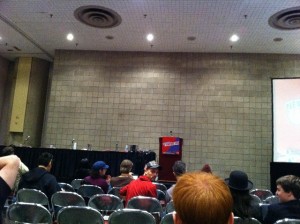
Exchanged cards with a few more writers and an independent publisher.
The panel was great and was filmed for a documentary of the same name. Again, an educational experience on the way comics break down financially and what not to do in the industry.
Once the panel ended, I met with the producer from London and showed him my portfolio. We spoke about his projects, common geeky interests, my projects, and he showed me production stills from a project his studio is currently working on. He said his company was looking for concept and story board artists and seemed to genuinely like my work. We exchanged cards and i gave him a folder of copies of my work. He said he’s be in touch within a week. If i don’t hear from him, I’ll drop him an email.
I highly recommend this experience for anyone interested in finding work in the comic book business or folks who just love comics and all that comes with them.
Shawn Dubin is a comics artist and Libby’s favorite nephew! He will have a show at Trust, 3rd & Arch, Friday, oct. 29, 6-9.


